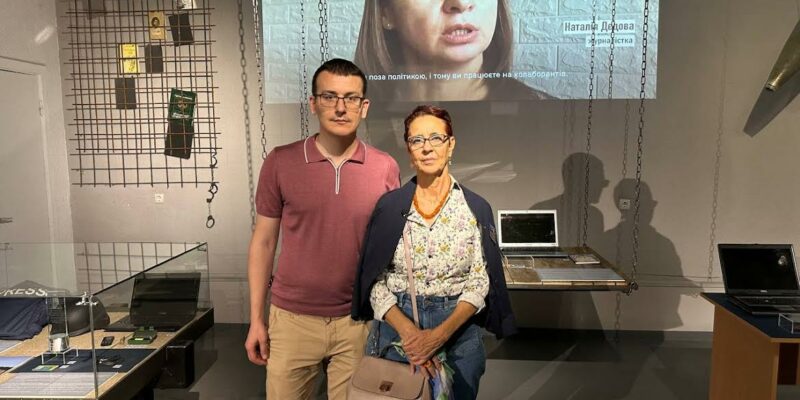“In Ukraine I understood that journalists never give up”

From the 16th to the 20th of September 2023, member of the EFJ Steering Committee Anna Del Freo travelled to Ukraine. She accepted the invitation of Sergiy Tomilenko, another member of the EFJ Steering Committee and president of the National Union of Journalist of Ukraine (NUJU). She went to the country, invaded by Russia, together with Anteas Alessandria, an Italian association of volunteers that already promoted several projects to help Ukraine’s population. Thanks to the support of the association, Anna Del Freo was able to visit her colleagues, who live and work in a country at war. She also conveyed the solidarity to the Ukrainian journalists on behalf of the Italian trade union of Journalists (FNSI) and of the EFJ. She recounts her journey in the following article.
By Anna Del Freo
Journalists are important. This is the motto of the Ukrainian journalists trade union and its president, Sergiy Tomilenko. The motto has a special meaning in times of war. Journalists indeed paid a high price for reporting about the Russian invasion of Ukraine: 72 of them lost their lives; 15 Ukrainian and foreign journalists were killed when reporting about the conflict, the rest of them were killed as civilians or soldiers, fighting at the front. Many of them found shelter in several Journalists Solidarity Centers.
Our first stop was Ivano Frankivsk, a city near the Hungarian border, where I visited the first Journalists Solidarity Center set up by NUJU with the support of the International Federation of Journalists (IFJ) and EFJ. I met extraordinary people, like Viktoria Plaxta, who runs the Solidarity center and Father Ivan Stefurak, a Catholic priest who studied journalism in Italy and actively helps the center. The solidarity centers network opened by NUJU has been fundamental for our colleagues: in Ivano Frankivsk, Viktoria explained to me that the center initially took steps to welcome journalists and their families displaced from the most dangerous and occupied places at the beginning of the war. Later, it provided journalists, who had lost everything, with equipments and spaces where they could work. In a third phase, the center also provided psychological assistance to some journalists and their families, in particularly serious cases.
Seeing in person the Solidarity centers that Sergiy Tomilenko had told us about on several occasions touched me deeply. Seeing our Ukrainian colleagues and the extreme conditions in which they often continued to work, was a big lesson for me: I understood that journalists never give up. The passion for their work remains rooted in every colleague I met. Even though several journalists have died, their colleagues keep on doing their job with passion.
My journey continued in Kiev, where I was delighted to meet up with Sergiy Tomilenko again, an extraordinary colleague who is leading the union through these difficult times of war. After visiting the NUJU headquarters and the solidarity center in the Ukrainian capital, I went to the exhibition on the Russian invasion of Ukraine at the National Historical Museum of the Second World War. Part of the exhibition is devoted to journalists, with exhibits provided by the Ukrainian Journalists’ Union. Many journalists have been imprisoned, kidnapped by the Russian occupiers and even tortured in the course of their work. I was able to see the objects that belonged to them. Like our Colleague Alina Komarova, photo editor for 25 years of the Mariupol newspaper Priazovsky Rabochyi, who was a war journalist and produced photo reports from the front. In March 2022, she miraculously escaped from the besieged city of Mariupol. Then there is the story of journalist Dmytro Khyliuk, kidnapped by the Russians on March 4, 2022 in the Kyiv region and deported to a Russian colony in the Volodymir region: even today the Russian authorities deny that he is detained and that he is facing legal proceedings. Alexander Hunka, who is 70 years old, was blocked for six months in the Kherson region occupied by the Russians and was repeatedly kidnapped, interrogated and even tortured: the occupiers also forced him to record an interview for their propaganda purposes. But he managed to escape and continues his work.
President Tomilenko also organized a visit to the city of Chernihiv, which was surrounded by the occupiers in the early days of the invasion before being liberated. About a month ago, the city was hit by a Russian missile, which caused extensive damage the theater. After visiting the theater and listening to the colleagues injured in the missile explosion, I also expressed the solidarity of the EFJ and its President Maja Sever to the local journalists in Chernihiv. Ukrainian local newspaper are facing major distribution problems: post offices are not working properly, so they have beenforced to dismiss numerous employees and are no longer able to distribute local newspapers in small towns and villages. This phenomenon, combined with a centralization of information that leaves little room for local news, is causing concern among journalists’ organisations.
This trip was very important both for me personally and the EFJ. Our Ukrainian colleagues very much appreciated the fact that a non-Ukrainian member of the Steering Committee went there and personally expressed solidarity to them. The EFJ stands by Ukrainian journalists and will continue to do so.






